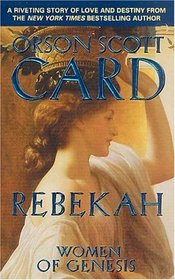Helpful Score: 3
I loved it, this is the second out of three in this series and I truly enjoyed it. I can't wait for the third to get here and then he has a new set that is due out and it will be interesting to see how those go. Looking forward to them all..keep them coming along this line Mr. Card!!
Helpful Score: 2
This is one of Card's "Women of Genesis" series, his historical novels about Biblical figures. It's not at all bad, but I wouldn't say it was Card's greatest work. These books were primarily written to illustrate Card's religious faith, but they do a good job of creating characters that bridge the gap between being historically believable and contemporarily accessible.
Interestingly, in the book the "birthright" of Abraham is not just a collection of blessings (as I have always read it) but the actual physical guardianship of holy, Biblical writings. Card works in a lot about the right to literacy. (Against Abraham and Isaac's will, Rebekah is literate and wishes to read the holy writings).
She's portrayed as a both strong and strong-willed woman, able to competently manage people, but also rigid and intolerant, with an unbending opinion of what she thinks is right, especially in religious matters. She doesn't hesitate to even criticize the patriarch in religious and family matters, and has no sympathy for religious practices other than her own. Card, disturbingly, but not surprisingly, seems to think her intolerance is pretty much a good thing, seeing as, of course, in his opinion, she is Right and the worshipers of Asherah and Baal are Wrong. I don't see things that way (and I totally disagree with the whole Importance of Raising Your Children in the True Faith theme which is a big part of Rebekah's life), so it made his Rebekah a very unsympathetic character to me.
Card's very idealized view of How Families Ought To Be is also a big part of the book, and there's a lot of a message that conflicts between people in families are often based on simple misunderstandings and everyone would get along if they just put more effort into understanding each other. That would be nice - but it's often also not true.
Finally, one hard-to-avoid weakness of the book is that, in this story, the conflict between Rebekah's sons, Jacob and Esau, and Jacob's 'theft' of the firstborn Esau's birthright is originally the main focus and most interesting part of the story. Concentrating on Rebekah as protagonist in this part of the book makes it slightly awkward, when the main drama is happening between other characters.
Interestingly, in the book the "birthright" of Abraham is not just a collection of blessings (as I have always read it) but the actual physical guardianship of holy, Biblical writings. Card works in a lot about the right to literacy. (Against Abraham and Isaac's will, Rebekah is literate and wishes to read the holy writings).
She's portrayed as a both strong and strong-willed woman, able to competently manage people, but also rigid and intolerant, with an unbending opinion of what she thinks is right, especially in religious matters. She doesn't hesitate to even criticize the patriarch in religious and family matters, and has no sympathy for religious practices other than her own. Card, disturbingly, but not surprisingly, seems to think her intolerance is pretty much a good thing, seeing as, of course, in his opinion, she is Right and the worshipers of Asherah and Baal are Wrong. I don't see things that way (and I totally disagree with the whole Importance of Raising Your Children in the True Faith theme which is a big part of Rebekah's life), so it made his Rebekah a very unsympathetic character to me.
Card's very idealized view of How Families Ought To Be is also a big part of the book, and there's a lot of a message that conflicts between people in families are often based on simple misunderstandings and everyone would get along if they just put more effort into understanding each other. That would be nice - but it's often also not true.
Finally, one hard-to-avoid weakness of the book is that, in this story, the conflict between Rebekah's sons, Jacob and Esau, and Jacob's 'theft' of the firstborn Esau's birthright is originally the main focus and most interesting part of the story. Concentrating on Rebekah as protagonist in this part of the book makes it slightly awkward, when the main drama is happening between other characters.
Helpful Score: 1
A wonderful novel by Orson Scott Card that gives an idea of what Rebekah's life was like through her eyes. Very well written and interesting.





